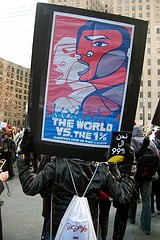

Economy
Goldman Sachs’ “toxic and destructive” environment forces director to quit
Greg Smith, executive director at Goldman Sachs, resigned from his post in an exclusive and sensational New York Times article, claiming that the Wall Street bank’s insensitive practice made him lose his pride and belief in the organisation.
The environment in which Goldman now operates, Smith writes, is “as toxic and destructive” as he has witnessed during almost 12 years at the firm. He also laments the company’s ruthless drive for profits – an approach that he says will force clients to lose trust.
Greg Smith, executive director at Goldman Sachs, resigned from his post in an exclusive and sensational New York Times article, claiming that the Wall Street bank’s insensitive practice made him lose his pride and belief in the organisation.
The environment in which Goldman now operates, Smith writes, is “as toxic and destructive” as he has witnessed during almost 12 years at the firm. He also laments the company’s ruthless drive for profits – an approach that he says will force clients to lose trust.
“To put the problem in the simplest terms, the interests of the client continue to be side-lined in the way the firm operates and thinks about making money”, said Smith, who fronted Goldman’s equity derivatives.
“Goldman Sachs is one of the world’s largest and most important investment banks and it is too integral to global finance to continue to act this way.
“The firm has veered so far from the place I joined right out of college that I can no longer in good conscience say that I identify with what it stands for.”
Smith goes onto recall the secret to Goldman’s historical success: “teamwork, integrity, a spirit of humility, and always doing right by our clients”.
But the foundation that built this 143-year-old company has been lost, he says.
“I am sad to say that I look around today and see virtually no trace of the culture that made me love working for this firm for many years.
“I no longer have the pride, or the belief.”
Smith’s words echo those of Rolling Stone journalist, Matt Tiabbi, who in 2010, indelibly and eloquently described Goldman as “a great vampire squid wrapped around the face of humanity, relentlessly jamming its blood funnel into anything that smells like money”.
Because of Tiabbi’s description, the squid briefly became somewhat of a totem to protestors in the Occupy Wall Street movement. Giant inflatable versions of the eight-armed cephalopod, along with accompanying chants of “Let’s go squidding!”, greeted Goldman employees into work on the morning of December 12 last year.
In his piece for the New York Times, Smith said that he knew his time at Goldman was coming to an end when he “could no longer look students in the eye and tell them what a great place this was to work”.
He added that the history books might attribute the company’s deterioration to current chief executive officer, Lloyd C. Blankfein, or president, Gary D. Cohn, who have “lost hold of the firm’s culture” whilst in charge of the firm.
Smith said, “I truly believe that this decline in the firm’s moral fibre represents the single most serious threat to its long-run survival”.
The now ex-Goldman executive director’s bold letter in the New York Times highlights the serious lack of consideration and loyalty shown by many of the high street (or Wall Street) banks.
This amoral epidemic sadly infiltrates the majority of the world’s major financial institutions, many of which are more concerned with profit than they are for people or indeed, the planet.
“It astounds me how little senior management gets a basic truth”, Smith adds. “If clients don’t trust you they will eventually stop doing business with you.
“It doesn’t matter how smart you are.”
It is because of this continued abuse of trust that Blue & Green Tomorrow encourages you to switch to a more ethical bank. Supporting banks that consider all three Ps listed above – profit, people and the planet – in a way that is sustainable and balanced, sends a very clear message to the banks that only consider a single P – profit.
And given that March is Move Your Money month, now is the perfect time to make the switch.
Related links:
Three UK banks named in top twenty ‘climate killers’ rating
We’re not all in this together: the rise of bloated capitalism
Picture source: Joe Lustri


 Environment12 months ago
Environment12 months agoAre Polymer Banknotes: an Eco-Friendly Trend or a Groundswell?

 Features11 months ago
Features11 months agoEco-Friendly Cryptocurrencies: Sustainable Investment Choices

 Features12 months ago
Features12 months agoEco-Friendly Crypto Traders Must Find the Right Exchange

 Energy11 months ago
Energy11 months agoThe Growing Role of Solar Panels in Ireland’s Energy Future



























